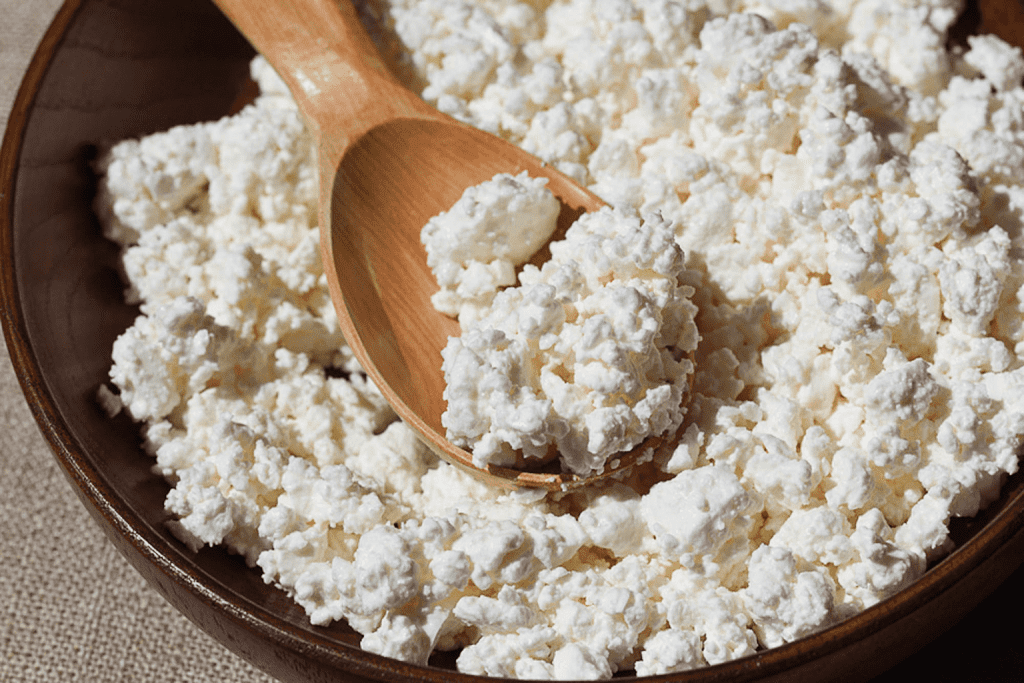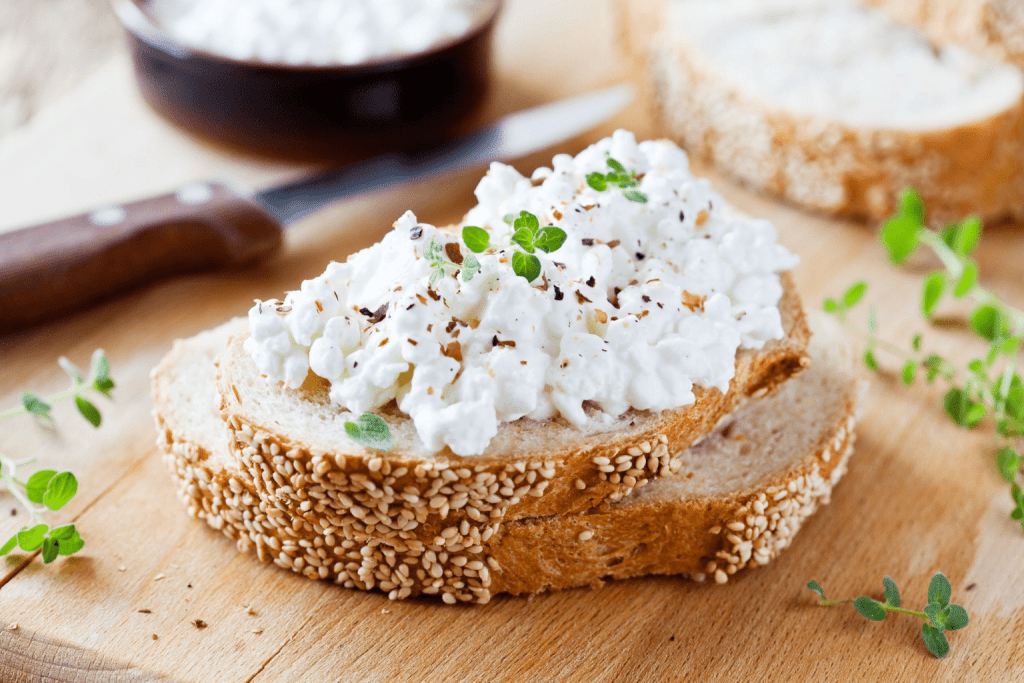Cottage cheese has gained popularity as a go-to snack for health enthusiasts everywhere. Its mild flavor, creamy texture, and impressive nutritional profile make it a versatile addition to various dishes. But what happens when you make cottage cheese a daily staple in your diet? Let’s explore the incredible benefits—and a few potential drawbacks—of eating cottage cheese every day.

Nutritional Profile of Cottage Cheese
Cottage cheese is packed with essential nutrients that can benefit your body in many ways. Here’s a quick look at what you’ll find in a typical serving:
- Protein: Cottage cheese is a fantastic source of protein, containing about 11 grams per half-cup serving. It’s particularly rich in casein, a slow-digesting protein that keeps you feeling fuller for longer.
- Calcium: A key mineral for strong bones and teeth, calcium is abundant in cottage cheese, making it an excellent choice for bone health.
- Phosphorus and B Vitamins: Cottage cheese is also high in phosphorus, which works alongside calcium to maintain bone health, and B vitamins, which support energy production and overall health.
- Probiotics: Certain varieties of cottage cheese contain probiotics, which can benefit gut health by promoting a healthy balance of bacteria.
With such a robust nutrient profile, it’s no wonder cottage cheese is often hailed as a superfood!
How Daily Cottage Cheese Consumption Benefits Overall Health
When you make cottage cheese a regular part of your diet, you may notice several positive changes. Here are some of the key health benefits:
1. Weight Management and Satiety
Cottage cheese is low in calories and high in protein, making it a great food for those aiming to lose or maintain their weight. The high protein content helps promote satiety, meaning you’re likely to feel full for longer after eating it. This effect can help you avoid unnecessary snacking and reduce overall calorie intake. Plus, the slow-digesting casein protein stabilizes your hunger throughout the day, making it a favorite choice for low-carb and ketogenic diets.
2. Muscle Growth and Repair
If you’re active or focus on building muscle, cottage cheese can play a crucial role in your nutrition plan. The high-quality protein in cottage cheese provides essential amino acids necessary for muscle repair and growth. Eating it post-workout can enhance recovery and optimize muscle synthesis. For this reason, cottage cheese has become a popular choice among athletes, bodybuilders, and fitness enthusiasts.
3. Bone Health Support
Cottage cheese is rich in calcium and vitamin D, two nutrients that are vital for maintaining strong, healthy bones. Regular consumption of calcium can help prevent conditions like osteoporosis as you age. By including cottage cheese in your diet, you’re also meeting a portion of your daily calcium requirements, promoting skeletal strength and reducing the risk of bone-related health issues later in life.
4. Improved Digestive Health

Certain types of cottage cheese contain probiotics—beneficial bacteria that support gut health. Probiotics help maintain a healthy balance in the gut microbiome, improving digestion and nutrient absorption. They can also reduce the risk of digestive issues like bloating, constipation, and irritable bowel syndrome. For those looking to support their digestive health, probiotic-rich cottage cheese is an easy and delicious way to do so.
Potential Downsides of Eating Cottage Cheese Every Day
While cottage cheese offers numerous health benefits, it’s essential to consider a few potential downsides, especially if you’re planning on eating it daily:
1. High Sodium Content

Many varieties of cottage cheese are high in sodium, which can increase blood pressure in salt-sensitive individuals. If you’re watching your sodium intake, look for low-sodium or no-salt-added options. A high-sodium diet can lead to cardiovascular issues over time, so monitoring your intake is essential if you consume cottage cheese frequently.
2. Lactose Intolerance Concerns
Cottage cheese is a dairy product, which means it contains lactose. For those with lactose intolerance, consuming cottage cheese can lead to digestive discomfort, including bloating, gas, and diarrhea. However, lactose-free versions are available, allowing you to enjoy the benefits without the digestive troubles. People with a dairy allergy should avoid cottage cheese entirely and consider other non-dairy alternatives rich in protein and calcium.
3. Limited Nutritional Variety
Though cottage cheese is nutrient-rich, relying solely on it can limit your nutritional intake. It’s important to eat a varied diet that includes a range of fruits, vegetables, whole grains, and other protein sources to ensure you’re getting a balanced array of nutrients.
Who Should Avoid or Limit Cottage Cheese Intake?

Some individuals may need to think twice before making cottage cheese a daily dietary staple:
- People on Low-Sodium Diets: If you’re managing blood pressure or are advised to limit sodium, look for low-sodium varieties of cottage cheese, or consider other protein sources.
- Those with Lactose Intolerance or Dairy Allergy: If you experience digestive discomfort from dairy, lactose-free cottage cheese is an option. If you have a dairy allergy, it’s best to avoid it altogether.
- Individuals with Kidney Issues: Because cottage cheese is high in protein and phosphorus, those with kidney concerns may need to limit their intake. Always consult with a healthcare provider to see what’s best for your specific condition.
How to Incorporate Cottage Cheese into Your Daily Diet
Cottage cheese is versatile and can easily be incorporated into many meals and snacks. Here are some delicious ways to enjoy it:
- As a breakfast addition: Add a scoop of cottage cheese to your morning smoothie, or pair it with fresh fruit, nuts, and a drizzle of honey for a satisfying breakfast.
- A savory snack: Spread cottage cheese on whole-grain toast with avocado and sprinkle some chili flakes or add it to salads for extra creaminess and protein.
- As a cooking ingredient: Use cottage cheese as a substitute for ricotta in lasagna, add it to scrambled eggs for a protein boost, or blend it into dips and dressings for a creamy texture.
With so many possibilities, cottage cheese can easily fit into your daily meals, helping you reach your health goals deliciously.
Conclusion: Should You Eat Cottage Cheese Every Day?
Incorporating cottage cheese into your daily diet can provide various health benefits, from supporting weight management and muscle growth to strengthening bones and enhancing digestion. However, it’s essential to be mindful of the potential downsides, such as sodium content and lactose concerns, especially if you have specific dietary restrictions.
Ultimately, cottage cheese can be a healthy and satisfying addition to most diets. By choosing the right variety for your needs—such as low-sodium or lactose-free options—and pairing it with other nutrient-dense foods, you can enjoy the benefits of this nutritious dairy product while maintaining a balanced and healthful eating plan.


